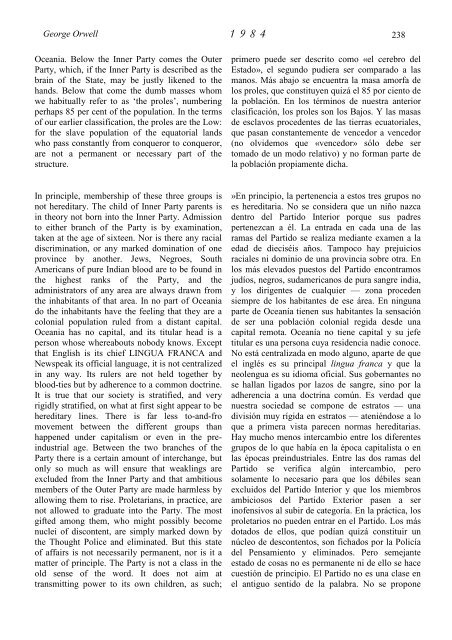Create successful ePaper yourself
Turn your PDF publications into a flip-book with our unique Google optimized e-Paper software.
George Orwell 1 9 8 4<br />
Oceania. Below the Inner Party comes the Outer<br />
Party, which, if the Inner Party is described as the<br />
brain of the State, may be justly likened to the<br />
hands. Below that come the dumb masses whom<br />
we habitually refer to as ‘the proles’, numbering<br />
perhaps 85 per cent of the population. In the terms<br />
of our earlier classification, the proles are the Low:<br />
for the slave population of the equatorial lands<br />
who pass constantly from conqueror to conqueror,<br />
are not a permanent or necessary part of the<br />
structure.<br />
In principle, membership of these three groups is<br />
not hereditary. The child of Inner Party parents is<br />
in theory not born into the Inner Party. Admission<br />
to either branch of the Party is by examination,<br />
taken at the age of sixteen. Nor is there any racial<br />
discrimination, or any marked domination of one<br />
province by another. Jews, Negroes, South<br />
Americans of pure Indian blood are to be found in<br />
the highest ranks of the Party, and the<br />
administrators of any area are always drawn from<br />
the inhabitants of that area. In no part of Oceania<br />
do the inhabitants have the feeling that they are a<br />
colonial population ruled from a distant capital.<br />
Oceania has no capital, and its titular head is a<br />
person whose whereabouts nobody knows. Except<br />
that English is its chief LINGUA FRANCA and<br />
Newspeak its official language, it is not centralized<br />
in any way. Its rulers are not held together by<br />
blood-ties but by adherence to a common doctrine.<br />
It is true that our society is stratified, and very<br />
rigidly stratified, on what at first sight appear to be<br />
hereditary lines. There is far less to-and-fro<br />
movement between the different groups than<br />
happened under capitalism or even in the preindustrial<br />
age. Between the two branches of the<br />
Party there is a certain amount of interchange, but<br />
only so much as will ensure that weaklings are<br />
excluded from the Inner Party and that ambitious<br />
members of the Outer Party are made harmless by<br />
allowing them to rise. Proletarians, in practice, are<br />
not allowed to graduate into the Party. The most<br />
gifted among them, who might possibly become<br />
nuclei of discontent, are simply marked down by<br />
the Thought Police and eliminated. But this state<br />
of affairs is not necessarily permanent, nor is it a<br />
matter of principle. The Party is not a class in the<br />
old sense of the word. It does not aim at<br />
transmitting power to its own children, as such;<br />
238<br />
primero puede ser descrito como «el cerebro del<br />
Estado», el segundo pudiera ser comparado a las<br />
manos. Más abajo se encuentra la masa amorfa de<br />
los proles, que constituyen quizá el 85 por ciento de<br />
la población. En los términos de nuestra anterior<br />
clasificación, los proles son los Bajos. Y las masas<br />
de esclavos procedentes de las tierras ecuatoriales,<br />
que pasan constantemente de vencedor a vencedor<br />
(no olvidemos que «vencedor» sólo debe ser<br />
tomado de un modo relativo) y no forman parte de<br />
la población propiamente dicha.<br />
»En principio, la pertenencia a estos tres grupos no<br />
es hereditaria. No se considera que un niño nazca<br />
dentro del Partido Interior porque sus padres<br />
pertenezcan a él. La entrada en cada una de las<br />
ramas del Partido se realiza mediante examen a la<br />
edad de dieciséis años. Tampoco hay prejuicios<br />
raciales ni dominio de una provincia sobre otra. En<br />
los más elevados puestos del Partido encontramos<br />
judíos, negros, sudamericanos de pura sangre india,<br />
y los dirigentes de cualquier — zona proceden<br />
siempre de los habitantes de ese área. En ninguna<br />
parte de Oceanía tienen sus habitantes la sensación<br />
de ser una población colonial regida desde una<br />
capital remota. Oceanía no tiene capital y su jefe<br />
titular es una persona cuya residencia nadie conoce.<br />
No está centralizada en modo alguno, aparte de que<br />
el inglés es su principal lingua franca y que la<br />
neolengua es su idioma oficial. Sus gobernantes no<br />
se hallan ligados por lazos de sangre, sino por la<br />
adherencia a una doctrina común. Es verdad que<br />
nuestra sociedad se compone de estratos — una<br />
división muy rígida en estratos — ateniéndose a lo<br />
que a primera vista parecen normas hereditarias.<br />
Hay mucho menos intercambio entre los diferentes<br />
grupos de lo que había en la época capitalista o en<br />
las épocas preindustriales. Entre las dos ramas del<br />
Partido se verifica algún intercambio, pero<br />
solamente lo necesario para que los débiles sean<br />
excluidos del Partido Interior y que los miembros<br />
ambiciosos del Partido Exterior pasen a ser<br />
inofensivos al subir de categoría. En la práctica, los<br />
proletarios no pueden entrar en el Partido. Los más<br />
dotados de ellos, que podían quizá constituir un<br />
núcleo de descontentos, son fichados por la Policía<br />
del Pensamiento y eliminados. Pero semejante<br />
estado de cosas no es permanente ni de ello se hace<br />
cuestión de principio. El Partido no es una clase en<br />
el antiguo sentido de la palabra. No se propone


